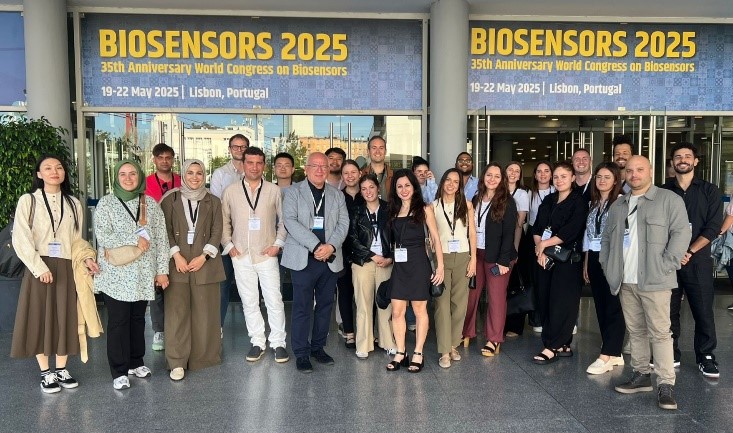The Nanobioelectronics and Biosensors Group played a key role in highlighting ICN2’s expertise in the field through their active participation in this renowned event.

Held from 19 to 22 May 2025 in Lisbon, Portugal, the 35th Anniversary World Congress on Biosensors brought together over 1,200 participants from around the globe, reaffirming its status as one of the most significant gatherings in the field of biosensing. ICREA Prof. Arben Merkoçi, leader of the ICN2 Nanobioelectronics and Biosensors Group, chaired the conference. He opened the event with a welcoming address on behalf of the organising committee and the conference sponsor, Elsevier.
His group had a strong presence throughout the congress. Dr Marianna Rossetti, Dr Isabella Sampaio, Dr Ruslan Álvarez, Dr Andrew Piper and Dr Daniel Quesada, together with PhD students Nerea Mariscal, Duygu Bedük, Massimo Urban, Andy Bruno, Ronaldo Challhua and Linhan Li, presented their latest findings through oral and poster sessions, showcasing a broad spectrum of topics across the biosensing landscape. In addition to their scientific contributions, Drs Rossetti, Sampaio, Piper and Quesada played a key organisational role by chairing several scientific sessions.
The involvement of GraphenicaLab collaborators (an ICN2 spin-off) further emphasised the institute’s thriving innovation ecosystem. José A. Marrugo, Leyla Karadurmuş and María Cambra were actively involved in the event, contributing to the scientific dialogue and strengthening the connection between academic research and entrepreneurial development in biosensing technologies.
Biosensors 2025 featured a comprehensive programme comprising daily plenary lectures, parallel scientific sessions and dynamic poster presentations. Two specialised summer schools — “Continuous Monitoring Biosensors” and “Synthetic Biology for Biosensors” — offered attendees immersive, hands-on learning experiences.
Overall, the conference emphasised the active role and ongoing commitment of the ICN2 Nanobioelectronics and Biosensors Group within the global biosensing community. Their contributions enriched the scientific programme and reaffirmed their leadership in advancing research in this key area.

